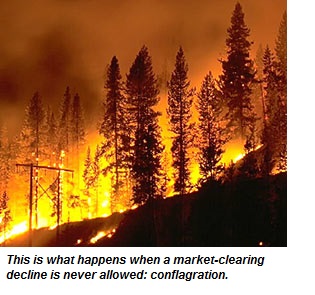Financialization and the Destruction of the Real Economy
ECONOMICS, 25 Sep 2017
Charles Hugh Smith – Activist Post
Strip an economy of capital, productive incentives, talent and yes, ethics, and what are we left with? An economy spiraling toward an inevitable collapse.
21 Sep 2017 – Financialization is destroying the real economy, but few in power seem to notice or care. The reason why is painfully obvious: those in power are reaping vast fortunes from the engines of financialization–for example, former President Obama: Obama Goes From White House to Wall Street in Less Than One Year.
This is not to single out President Obama as a special case; politicos across the spectrum depend on the engines of financialization to fund their campaigns and make them multi-millionaires, and corporate managers and financiers have skimmed billions of dollars in gains not from producing new, better and more affordable goods and services but by playing financialization games such as borrowing billions to buy back stocks, leveraged buyouts, and so on–all of which have reaped the insiders gargantuan fortunes while hollowing out the real economy.
Financialization necessarily hollows out the real economy, as Gordon Long and I detail in this new video program: The Results of Financialization – Part I (34 minutes)
httpv://www.youtube.com/watch?v=P0F0d8Xi36k
The key dynamic is that financialization creates irresistible incentives to ramp up debt and leverage at the expense of the real economy. Those who fail to exploit financialization will underperform the market and be fired.
As Gordon explains, if a CEO refuses to load a company up with debt, a private-equity financier with access to cheap Federal Reserve credit will scoop up the company in a private buyout, fire the management, extract immense profits by loading the company with debt, then take the hollowed-out shell public again, reaping another windfall of financialized gains.
Note that the private-equity financiers have every incentive to lay off employees, especially experienced workers who earn higher salaries, to reduce costs before they take the hollowed-out shell public.
How can corporations pay out more to shareholders than they actually earned? Easy–financialization.
Another key dynamic in financialization is limitless liquidity and super low interest rates set by central banks–rates that are so low and liquidity so abundant that corporations can roll over their debt and actually add more debt and keep their interest payments unchanged.
This dynamic inevitably leads to zombie corporations–corporations with low rates of growth and profitability and high debt loads that in an unfinancialized economy would be recognized as insolvent and liquidated.
As we explain, financialization skews the risk-reward in favor of financial games, so real-world investments no longer make sense. Why risk building a factory in the U.S. or training workers when the pay-off is uncertain, when there are so many ways to reap immense fortunes via financial games that are ultimately backstopped by the Federal Reserve or federal agencies (i.e. the taxpayers)?
As many observers have noted, these perverse incentives have siphoned human talent away from productive employment and into enormously well-compensated but parasitic, exploitative financialization-related jobs.
 Strip an economy of capital, productive incentives, talent and yes, ethics, and what are we left with? An economy spiraling toward an inevitable collapse. The metaphor I’ve used to explain this in the past is the Yellowstone forest fire. The deadwood of bad debt, extreme leverage, zombie companies and all the other fallen branches of financialization pile up, but the central banks no longer allow any creative destruction of unpayable debt and mis-allocated capital; every brush fire is instantly suppressed with more stimulus, more liquidity and lower interest rates.
Strip an economy of capital, productive incentives, talent and yes, ethics, and what are we left with? An economy spiraling toward an inevitable collapse. The metaphor I’ve used to explain this in the past is the Yellowstone forest fire. The deadwood of bad debt, extreme leverage, zombie companies and all the other fallen branches of financialization pile up, but the central banks no longer allow any creative destruction of unpayable debt and mis-allocated capital; every brush fire is instantly suppressed with more stimulus, more liquidity and lower interest rates.
As a result, the deadwood sapping the real economy of productivity and innovation is allowed to pile higher.
The only possible output of this suppression is an economy piled high with explosive risk. Eventually Nature supplies a lightning strike, and the resulting conflagration consumes the entire economy.
__________________________________________
Read More:
- The Yellowstone Analogy and The Crisis of Neoliberal Capitalism (May 18, 2009)
- The Financial Markets Now Control Everything (April 29, 2015)
- Why Our Status Quo Failed and Is Beyond Reform.
Author’s Bio
Go to Original – activistpost.com
DISCLAIMER: The statements, views and opinions expressed in pieces republished here are solely those of the authors and do not necessarily represent those of TMS. In accordance with title 17 U.S.C. section 107, this material is distributed without profit to those who have expressed a prior interest in receiving the included information for research and educational purposes. TMS has no affiliation whatsoever with the originator of this article nor is TMS endorsed or sponsored by the originator. “GO TO ORIGINAL” links are provided as a convenience to our readers and allow for verification of authenticity. However, as originating pages are often updated by their originating host sites, the versions posted may not match the versions our readers view when clicking the “GO TO ORIGINAL” links. This site contains copyrighted material the use of which has not always been specifically authorized by the copyright owner. We are making such material available in our efforts to advance understanding of environmental, political, human rights, economic, democracy, scientific, and social justice issues, etc. We believe this constitutes a ‘fair use’ of any such copyrighted material as provided for in section 107 of the US Copyright Law. In accordance with Title 17 U.S.C. Section 107, the material on this site is distributed without profit to those who have expressed a prior interest in receiving the included information for research and educational purposes. For more information go to: http://www.law.cornell.edu/uscode/17/107.shtml. If you wish to use copyrighted material from this site for purposes of your own that go beyond ‘fair use’, you must obtain permission from the copyright owner.
